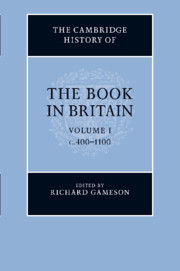Book contents
- Frontmatter
- 1 From Vindolanda to Domesday: the book in Britain from the Romans to the Normans
- PART I THE MAKING OF BOOKS
- PART II THE CIRCULATION OF BOOKS
- PART III TYPES OF BOOKS AND THEIR USES
- PART IV COLLECTIONS OF BOOKS
- 27 Patrick, apostle of the Irish
- 28 The library of Iona at the time of Adomnán
- 29 Literacy in Anglo-Saxon England
- 30 Aldhelm’s library
- 31 The library of the Venerable Bede
- 32 The library of Alcuin’s York
- 33 The library of Cynewulf
- 34 King Alfred and his circle
- 35 Ælfric’s library
- 36 The library of Byrhtferth
- 37 The library of Wulfstan of York
- 38 Rhygyfarch ap Sulien and Ieuan ap Sulien
- PART V CODA
- Bibliography
- Concordance of named manuscripts
- Index of manuscripts
- General Index
- Plate 4.1: The Lindisfarne Gospels"
- Plate 5.1: The Lichfield/St Chad Gospels"
38 - Rhygyfarch ap Sulien and Ieuan ap Sulien
from PART IV - COLLECTIONS OF BOOKS
Published online by Cambridge University Press: 28 March 2012
- Frontmatter
- 1 From Vindolanda to Domesday: the book in Britain from the Romans to the Normans
- PART I THE MAKING OF BOOKS
- PART II THE CIRCULATION OF BOOKS
- PART III TYPES OF BOOKS AND THEIR USES
- PART IV COLLECTIONS OF BOOKS
- 27 Patrick, apostle of the Irish
- 28 The library of Iona at the time of Adomnán
- 29 Literacy in Anglo-Saxon England
- 30 Aldhelm’s library
- 31 The library of the Venerable Bede
- 32 The library of Alcuin’s York
- 33 The library of Cynewulf
- 34 King Alfred and his circle
- 35 Ælfric’s library
- 36 The library of Byrhtferth
- 37 The library of Wulfstan of York
- 38 Rhygyfarch ap Sulien and Ieuan ap Sulien
- PART V CODA
- Bibliography
- Concordance of named manuscripts
- Index of manuscripts
- General Index
- Plate 4.1: The Lindisfarne Gospels"
- Plate 5.1: The Lichfield/St Chad Gospels"
Summary
Sulgenus Sapiens, Sulien the Wise of Llanbadarn Fawr in Ceredigion (1011–91), was twice bishop of St David’s, once 1072/3–78 and again 1080–5. Sulien, whose name means ‘born on a Sunday’, may be responsible for the introduction of the Vita Sancti Maedoc into Wales, if he did not himself compose it. The first of his sons, named Ricemarchus or Rhygyfarch, derived from Old Welsh ri + cyfarch ‘salutation of the king (of heaven)’ (1056/7–99), composed five extant works: in Latin the prose Vita Sancti Dauid (1081), three poems, De psalterio ‘On the Psalter’ (?1079), De messe infelici ‘On an Unhappy Harvest’, and Planctus Ricemarch, ‘Rhygyfarch’s Lament’ for the Norman Conquest of Wales (post-1093); and in Welsh perhaps at least part of the Four Branches of the Mabinogi. The fourth son, named after the fourth evangelist Iohannes or Ieuan (d. 1137), also composed five extant works: in Latin the prose Vita Sancti Paterni (1081), three poems, Inuocatio Iohannis ‘Ieuan’s Invocation’, Carmen de vita et familia Sulgeni ‘Song about the Life and Family of Sulien’ (post-1080), Disticha Iohannis ‘Ieuan’s Distichs’; and in Welsh an englyn on the episcopal staff of St Padarn.
From the family library at Llanbadarn Fawr two manuscripts survive. One contains the Martyrologium Hieronymianum, a Psalterium iuxta Hebraeos Hieronymi, and on folio 158v in Rhygyfarch’s autograph his verses De psalterio, in which he names himself the son of Sulien as author, Ithael as scribe of the manuscript, and his brother Ieuan as illuminator (see Plate 9.4). Another contains a copy of Augustine De Trinitate, written at his father’s request, with all Ieuan’s Latin and Welsh verses in his autograph.
Keywords
- Type
- Chapter
- Information
- The Cambridge History of the Book in Britain , pp. 701 - 706Publisher: Cambridge University PressPrint publication year: 2011
- 1
- Cited by

